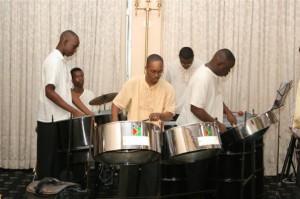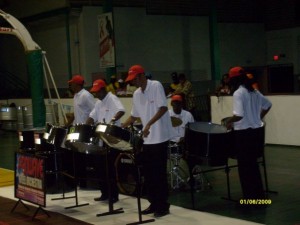By Venessa Deosaran
The sweet sounds of the Parkside Steel Orchestra Band resonate at every event they perform, and as they seduce their listeners with their artistry in steel pan, they are focused not only to entertain but to sustain the art form.
Band manager and pannist Andrew Tyndall, speaking with Guyana Times Sunday Magazine, said Parkside was started in 1998 by Mildred Lowe, who was at the time director of culture, a department within the Ministry of Education. The objectives, he outlined, were to develop persons musically, teach them about team work, and help sustain the art form which at that time was experiencing a lull. The steel pan enthusiast said in his opinion the band, then and now, was able to fulfil and surpass these objectives.

History
“I was one of the founding members of the band. Mrs Lowe’s son, Curly Lowe, and I went to President’s College together. We were into music, both of us from a young age, and played steel pan. He invited me to join the band when his mother started it. We were there from the inception, working with the group, getting other persons to join,” he reminisced.
In the beginning, there were about 15 persons who were permanent members; now there are more than 30 members. There are ‘stage members’, who practice throughout the year with the band, and there are members who play only when the band is preparing for competitions.
The band has expanded to include a junior band called the ‘Panwave Academy’. In this band there are students 7-16 years, and in the senior band, members’ ages range from 15 to 32 years.
In 2008, a steel pan development programme was implemented, and via this, the band has been steadily improving in their output.
Victories
Parkside has seen many victories over the years. Their determination to keep the art form alive has contributed to numerous winning competitions. They have also travelled extensively in the Caribbean to compete and perform.
In 2006, they competed in the Caribbean Seven-A Side Steel Band competition and got second. Although second then, many first place trophies followed as they competed over the years.

Future events
The band has two concerts planned, one in early May with the theme, ‘Pan, Jazz and Spoken Word’ in hopeful collaboration with renown saxophonist Francis Bailey. The other is scheduled for July with the theme, ‘Music of Asia’. “We have a diverse culture, and what we found is that about three ethnic groups came from Asia and so we decided to present this culture on pan. We’ll have Chinese and Indian music and also music from other parts of Asia. We’re thinking outside the box in presenting something different and exciting; not the normal music you would hear on steel pan,” he disclosed.
There is also a week-long tour planned for Suriname where they are expected to perform at three concerts. This is the band’s fourth visit to the country. They have also taken their sweet sounds of pan to Barbados and Brazil.
Funding
“Pan instruments are expensive. They cannot be picked up from a store, you have to order it from a tuner, and because of the craftsmanship involved, it is expensive to purchase, so we need more funding in order to get more schools involved,” Tyndall appealed.
He noted that there is a need for more corporate citizens to help with funding. He plans on working with groups out of Georgetown but to do this, the band needs the support from the corporate community. The Ministry of Culture, Youth and Sport and Republic Bank are contributing significantly in keeping the art form alive.
In attempts to sustain the art form, two bands were started in Bartica, two in Berbice, one in Buxton, and others at Plaisance Secondary and Dolphin Secondary schools.
Panwave also works with students from St John’s, Christ Church and a number of other schools. There are about 40 to 45 students in this programme. With financial support, a pan minors’ music literacy camp is held in July-August, where more than 150 young people are trained in steel pan playing techniques, and are also taught the rudiments of music theory.
“When a company invests in a band, you teach a life skill to about 30 young people. This also helps them to be gainfully occupied instead of wasting time after school. So there is a need for more funding so that more can be done to keep the art form alive,” he encouraged.
Future of steel pan
Part of the Music Development Office at the Ministry of Culture, Youth and Sport, Tyndall said he has seen a growth in audiences coming out to support steel pan music. For the past three years, he has noticed sold-out crowds at the steel pan competitions usually held at Cliff Anderson Sports Hall, which may now have to be moved to a bigger venue.
When asked if steel pan could experience a lull as it has in the past, Tyndall said, “My role in the ministry is to ensure that there are adequate programmes to keep the art form alive. Also, we have personal responsibility in sustaining it. For those managing a band, you must ensure there are programmes to keep your members active throughout the year; only then can we avoid this from happening. (Taken from Guyana Times Sunday Magazine)
By Venessa Deosaran
The sweet sounds of the Parkside Steel Orchestra Band resonate at every event they perform, and as they seduce their listeners with their artistry in steel pan, they are focused not only to entertain but to sustain the art form.Band manager and pannist Andrew Tyndall, speaking with Guyana Times Sunday Magazine, said Parkside was started in 1998 by Mildred Lowe, who was at the time director of culture, a department within the Ministry of Education. The objectives, he outlined, were to develop persons musically, teach them about team work, and help sustain the art form which at that time was experiencing a lull. The steel pan enthusiast said in his opinion the band, then and now, was able to fulfil and surpass these objectives.
History “I was one of the founding members of the band. Mrs Lowe’s son, Curly Lowe, and I went to President’s College together. We were into music, both of us from a young age, and played steel pan. He invited me to join the band when his mother started it. We were there from the inception, working with the group, getting other persons to join,” he reminisced.In the beginning, there were about 15 persons who were permanent members; now there are more than 30 members. There are ‘stage members’, who practice throughout the year with the band, and there are members who play only when the band is preparing for competitions.The band has expanded to include a junior band called the ‘Panwave Academy’. In this band there are students 7-16 years, and in the senior band, members’ ages range from 15 to 32 years.In 2008, a steel pan development programme was implemented, and via this, the band has been steadily improving in their output.
VictoriesParkside has seen many victories over the years. Their determination to keep the art form alive has contributed to numerous winning competitions. They have also travelled extensively in the Caribbean to compete and perform.In 2006, they competed in the Caribbean Seven-A Side Steel Band competition and got second. Although second then, many first place trophies followed as they competed over the years.
Future events The band has two concerts planned, one in early May with the theme, ‘Pan, Jazz and Spoken Word’ in hopeful collaboration with renown saxophonist Francis Bailey. The other is scheduled for July with the theme, ‘Music of Asia’. “We have a diverse culture, and what we found is that about three ethnic groups came from Asia and so we decided to present this culture on pan. We’ll have Chinese and Indian music and also music from other parts of Asia. We’re thinking outside the box in presenting something different and exciting; not the normal music you would hear on steel pan,” he disclosed.There is also a week-long tour planned for Suriname where they are expected to perform at three concerts. This is the band’s fourth visit to the country. They have also taken their sweet sounds of pan to Barbados and Brazil.
Funding “Pan instruments are expensive. They cannot be picked up from a store, you have to order it from a tuner, and because of the craftsmanship involved, it is expensive to purchase, so we need more funding in order to get more schools involved,” Tyndall appealed.He noted that there is a need for more corporate citizens to help with funding. He plans on working with groups out of Georgetown but to do this, the band needs the support from the corporate community. The Ministry of Culture, Youth and Sport and Republic Bank are contributing significantly in keeping the art form alive.In attempts to sustain the art form, two bands were started in Bartica, two in Berbice, one in Buxton, and others at Plaisance Secondary and Dolphin Secondary schools.Panwave also works with students from St John’s, Christ Church and a number of other schools. There are about 40 to 45 students in this programme. With financial support, a pan minors’ music literacy camp is held in July-August, where more than 150 young people are trained in steel pan playing techniques, and are also taught the rudiments of music theory.“When a company invests in a band, you teach a life skill to about 30 young people. This also helps them to be gainfully occupied instead of wasting time after school. So there is a need for more funding so that more can be done to keep the art form alive,” he encouraged.
Future of steel pan Part of the Music Development Office at the Ministry of Culture, Youth and Sport, Tyndall said he has seen a growth in audiences coming out to support steel pan music. For the past three years, he has noticed sold-out crowds at the steel pan competitions usually held at Cliff Anderson Sports Hall, which may now have to be moved to a bigger venue.When asked if steel pan could experience a lull as it has in the past, Tyndall said, “My role in the ministry is to ensure that there are adequate programmes to keep the art form alive. Also, we have personal responsibility in sustaining it. For those managing a band, you must ensure there are programmes to keep your members active throughout the year; only then can we avoid this from happening. (Taken from Guyana Times Sunday Magazine)



